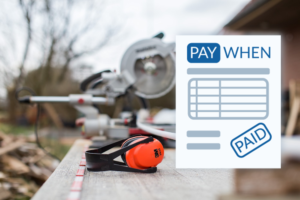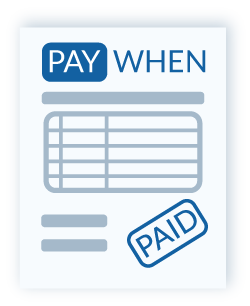
In the following post, we’re going to examine the pay-when-paid clause. This is a provision that frequently appears in subcontracts — the agreement between the prime contractor and a sub.
In the construction business, everything comes down to the construction contract. And that’s unfortunate because most of the people who make up the construction industry aren’t lawyers, they’re contractors, builders, and suppliers. They haven’t spent their professional lives learning how to interpret contract clauses and the intricacies of construction law — they’ve spent their careers building things.
But this unfortunate (yet completely understandable) lack of legal knowledge in the industry doesn’t change the fact that millions of construction contracts are signed each and every year by people who probably don’t always know exactly what the terms of the contract mean.
What pay-when-paid means
In layman’s terms, a “pay-when-paid” clause is the prime contractor informing the subcontractor that they will pay them after they receive payment from their customer. That is usually the property owner, but can also be the developer. Similarly, a “Pay-If-Paid” clause is the prime contractor informing the subcontractor that they’ll get paid if – and only if! – the prime gets paid first.
Though the actual language used in the contract might be a little more complicated, the meaning of these two clauses is really this simple. They’re both used as a method for the prime contractor to reduce their payment risk. Basically, these clauses are the GC’s attempt to say “If I don’t get paid, then no one gets paid!”
Download the 50-State Guide to Contract Provisions: Pay-If-Paid and Pay-When-Paid
Are Pay-When-Paid clauses fair?
That’s an interesting question — a real moral dilemma, if you will.
On the one hand, as the money flows down through a project, from the owner to the prime contractor and then to all of the subs, that money really gets “re-used” each time it flows through one of the project participants.
As an example, you might have “Mary,” the project owner, who pays “Paul,” the prime contractor. “Paul” then turns around and takes a part of the payment he received to pay “Peter,” the subcontractor.
So when the prime contractor gets a $1,000 payment from the project owner, they will take a portion of that payment — let’s say $750 — and use it to pay the subcontractor. If the owner fails to pay the prime and that $1,000 never comes, then there is no money to pay the subcontractor.
So, this scenario really stinks, but it’s not unfair, right?
On the other hand, that subcontractor did everything by the book. They did all the work they were contracted for, on time and on budget. Even more importantly, they paid all of their people — their laborers, their suppliers, their salaries — all the time assuming that they would be expecting the payment from the prime contractor soon enough.
While it may stink that the prime got stiffed on the payment by the project owner, that’s not really the subcontractor’s fault, is it? So, why should the subcontractor take the payment hit when they did everything the right way? That just doesn’t seem right!
Are pay-when-paid clauses even legal?
It’s a mixed bag as to whether or not these clauses are allowed. Generally speaking, several states have ruled that “pay-when-paid” clauses function as timing mechanisms. That is, a prime contractor can’t use a “Pay-When-Paid” clause in a contract to put off paying a subcontractor forever, even if the original payment from the project owner never materializes. Many of these states have said that even if payment is never received by the prime contractor from the project owner, payment is still due to the subcontractor within a “reasonable time.”
There are a few states where “Pay-If-Paid” clauses are unenforceable — this includes such major states as California, and New York. There are far more states where “Pay-When-Paid” clauses are allowed, but only as a timing mechanism (as described above).
Therefore, in the states where “Pay-When-Paid” clauses are enforceable as timing mechanisms, the prime contractor can use the clause as a justification for delaying payment to the subcontractor, but cannot use the clause as a justification to avoid paying the subcontractor altogether, no matter what happened with the payment from the project owner.
Further Reading
Learn more about the difference between pay-if or pay-when provisions — and why they matter.
Signing a construction contract? Make sure you check out Levelset’s Construction Contract Review Checklist — What to Look for When Reviewing a Contract.

